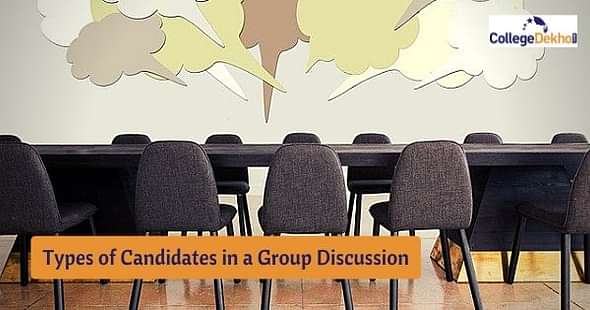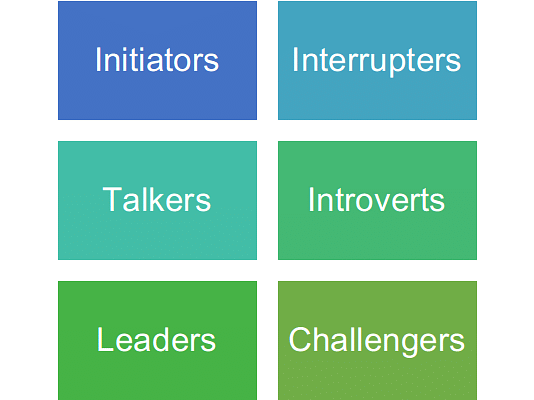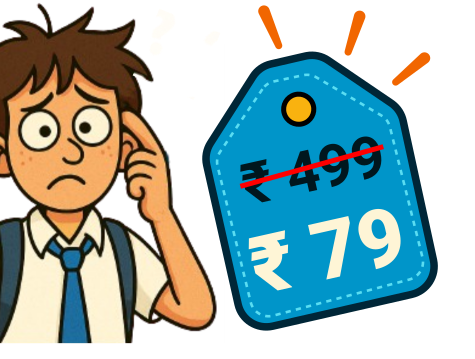Group Discussions are a part of the selection processes of college admissions or recruitment exams. In every Group Discussion, you are likely to come across several types of candidates. Here are some types of candidates that can be found in a Group Discussion.

With a background in Engineering and an avid interest in the armed forces, I can tell you that I am no stranger to Group Discussions. And with that level of assertiveness, I can also state that they are a pain to go through for the majority of the candidates. Except for the candidates who go through our Group Discussion tips , they are usually able to do quite well in the round.
Jokes aside, Group Discussion is a necessary step int the selection process of many professional courses such as MBA or even in recruitment exams such as the SBI PO . Therefore, you will usually find different kinds of candidates with different backgrounds in a Group Discussion.
Since how well you do in a GD depends not only on your knowledge but your coordination with a group, it is important to understand what kind of people are in your group. Usually, candidates in a group discussion can be identified to fall into certain categories.
Also Read: Group Discussion Topics for MBA Admissions
Let's take a look at some of the types of people you will usually find in a Group Discussion.

1. The Initiators
These are people who like to be the one to start the GD. Often time, you will find that there are multiple candidates who start speaking as soon as the discussion starts but usually the noise dies down with a single candidate speaking.
Being an initiator does improve your chances of success in a Group Discussion but you have to be extra careful about making a point and letting the discussion slide to the group. Often times, an initiator would just describe the topic and provide a little elaboration. This is the right way to go.
When initiating a GD, make sure you have a clear point and are giving a good direction to the discussion.
Skills Required: Confidence, Knowledge of a Subject, Good Communication Skills, Ability to Hold Attention
2. The Interrupters
These are candidates who constantly cut other people short in the middle of their point. They may be candidates who are too impatient to put their point across or are not really listening to the person who is speaking.
Interrupters are generally perceived as rude and aggressive in a Group Discussion. While it sometimes does become necessary to interrupt a person who is talking in a Group Discussion, there are healthy ways to do it.
Starting with some along the times of 'If I may state my point as well...' or 'I agree/disagree with what you said...' and stating your own idea is a good way to go about it without being rude.
Skills Required: Polite Demeanour, Critical Thinking Ability, Confidence
Also Read: GD, PI and WAT Preparation Tips
3. The Talkers
Some candidates have the habit of taking over the discussion. They will have something to say at every point of the discussion without considering if they are adding anything to the discussion or not.
Talkers are not good for any Group Discussion. In a GD, you should be concise with your point and once it is made, give others a chance to talk. This also allows you to listen to what others are saying, which is very important in a discussion.
4. The Introverts
Introverts are shy candidates who will rarely speak during a group discussion. These candidates may have a point but often keep waiting for the chance to speak. Or they may not have any point to make.
Staying silent during a group discussion is an almost sure way to get rejected. If you have a point, put it across calmly. Even if you feel shy at first, speaking up will help you to get practice and gain confidence.
5. The Leaders
These are the smartest candidates during a group discussion. They might not be the ones to initiate or the ones who speak a lot but they understand the topic and put good points across.
Leaders even may sometimes help other candidates get a chance to talk and keep the discussion stay on track. Leaders stay calm and often perform impressively in Group Discussions.
Skills Required: Confidence, Analytical Ability, Good Listening Skills, Convincing Attitude, Good Communication Skills
6. The Challengers
These are the people who can question everything during a GD. Challengers are not afraid to ask strong questions even to the best contenders during the discussion. They speak their mind and have a tendency to analyse the situation.
While challenging somebody during a discussion may not be a healthy trait, it can bring out some important points. It can certainly show that one is paying attention during the discussion and hence can go in your favour.
However, some candidates may be a little too challenging. They may question almost everything or ask personal questions or try to be intent of proving something wrong with their question. These are all negative uses and should be avoided.
Skills Required: Confidence, Critical Thinking, Sharp Perception, Attentive
Also Read: Online GD / PI Preparation Tips
These were some types of candidates that you may find in your Group Discussion. People who have already been through GD rounds will surely be able to categorize put some of the candidates from their groups into these categories.
You may also find that you fit into one or more of these categories during GDs. Understanding which type of GD candidate you are will help you work on any negative qualities and get better at Group Discussions.
It is important to remember that moderation is always the key to Group Discussions. The point of a GD is not to argue but to discuss a topic. The moderator of a GD may even ask the group to come to a conclusion during a GD round. If things do get heated up in a GD, it is always better to stay out of it if you see things getting out of control.
Also Read
Written Ability Test (WAT) 2021 for IIMs and Other Top MBA Colleges - Writing Tips & WAT Topics | |
|---|---|
IIM CAP 2021 - Dates, Centres, Shortlist Criteria, Selection Process |
If you have any queries, ask our experts on the CollegeDekho QnA Zone . For help with admissions, fill our Common Application Form (CAF) or call our toll-free student helpline number 1800-572-9877.
Are you feeling lost and unsure about what career path to take after completing 12th standard?
Say goodbye to confusion and hello to a bright future!

Was this article helpful?




















Similar Articles
List of Colleges Accepting Above 35,000 Rank in TS ICET 2025
List of Colleges Accepting 5,000 to 10,000 Rank in TS ICET 2025
Top Delhi University Colleges 2025: NIRF Rankings & Score
SAMS Odisha +2 Admissions 2025 (LIVE): Merit List (Out), Selection Process, Top Colleges
Bhim Rao Ambedkar College CUET UG Cutoff 2025: Expected Cutoff based on Previous Trends
List of ITI Colleges in Delhi: Government & Private Colleges, Fees, Scholarships